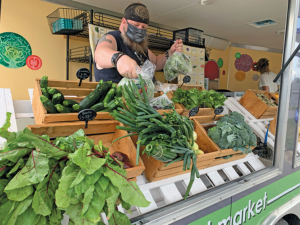If you’re trying to find the Good Food Bus in the neighborhoods of Lewiston, don’t look for an actual bus. It’s more like a traveling farm stand with big windows, where market leaders Jay Fiori and Sophia Gamache are helping people select local fruits, vegetables, eggs and honey.
As customers look through the windows at the fresh produce, they’ll find similar prices as the grocery store; however, if they are a Good Food Bus member, they’ll get a 50% discount off everything and membership is free.
“Free memberships and point-of-sale discounts were established after conversations with the community,” said Price Hulin, the Good Food Bus program coordinator. Members keep punch cards to keep track of purchases, receive text message reminders of the bus’s schedule and links to healthy recipes that can easily be prepared from the produce being sold.

Hulin said that engaging members makes shopping more of an experience and increases the likelihood that customers will return. “And who wouldn’t enjoy being able to purchase local fruits and veggies, at half the price, in their neighborhood!” he added. “People in Maine have a high level of enthusiasm and a willingness to connect with each other that I really admire. It makes the Good Food Bus a real community hub.”
The Good Food Bus was launched by the St. Mary’s Nutrition Center in 2015, with help from Cultivating Community, a Portland based nonprofit, and the Harvard Pilgrim Health Care Foundation, which funds mobile food markets around New England. Overall, St. Mary’s Nutrition Center has a simple yet enormous goal to help people grow, access and afford fresh fruits and vegetables. That’s an important mission given that households in Maine have a higher than national average food insecurity rate, and is especially relevant in Lewiston, where almost a quarter of the residents live in poverty.
In 1999, St. Mary’s started Lots to Gardens, a community garden program still in operation in Lewiston that helps people living in town access plots to grow their own food. As a young woman, Kirsten Walter was one of Lots to Gardens first employees and her deep experience and knowledge of food access issues in the Lewiston area has grown with the organization. Today she is the director of what has become St. Mary’s Nutrition Center.
In recent years, the Nutrition Center has grown their scope of land access from small urban gardens to larger rural farms. In 2019 St. Mary’s organized a Farmland Access Conference to help the Somali Bantu Community Association acquire 100+ acres that would later become Liberation Farms in Wales. Knowing that fresh produce provides the basis of whole-body health, these are smart investments that have long-lasting impacts. Walter said that every summer, St. Mary’s Nutrition Center’s food pantries see lower attendance because of people’s ability to grow their own food.
But not everyone in need of more fresh, healthy food has the skills, time and/or ability to grow their own, so the Good Food Bus brings affordable, fresh produce to their homes. One weekly stop is at Blake Street Towers, an apartment building for seniors and/or people with disabilities. The bus provides a convenient, commute-free shopping trip for fresh food that people can depend on.
“St. Mary’s is in a constant process of shifting and testing and responding to emerging needs because the conditions of hunger are constantly shifting with the market,” Walter said. “We are always checking to make sure we are meeting the need.”

The Good Food Bus will be out and about in Lewiston through October. It stops at one to three locations a day, with hours at St. Mary’s Nutrition Center on Bates Street from 4 to 6 p.m. on Monday and 3 to 5 p.m. on Thursday. Most of the produce comes from Emery Family Farm, a small-scale operation in Wayne or Fresh Start Farms, a farmer training program in Lisbon.
“There are lots of new Americans in the Fresh Start Farms program and they have a co-op sales model,” said Hulin. “We buy wholesale from them, and we just started buying what we can from Liberation Farms too. Buy from any local farm when you can. They need our support.”
Lewiston recently received a HUD Choice Neighborhoods Grant, federal money that will invest in childcare, workforce readiness and neighborhood infrastructure improvements. Walter said she is looking forward to a community food center, which is planned to be a multi-functional space with a co-op grocery store, a shared commercial use kitchen with cold and dry food storage space, all situated on the first floor of a new apartment building to be completed in 2024.
“Lewiston is an exciting place,” Walter said. “The surrounding farmland is unique, there’s a network of urban gardens. We want to continue to connect this vibrant downtown to agricultural strategies, addressing emergency needs but also building sustainability.”

Comments are not available on this story. Read more about why we allow commenting on some stories and not on others.
We believe it's important to offer commenting on certain stories as a benefit to our readers. At its best, our comments sections can be a productive platform for readers to engage with our journalism, offer thoughts on coverage and issues, and drive conversation in a respectful, solutions-based way. It's a form of open discourse that can be useful to our community, public officials, journalists and others.
We do not enable comments on everything — exceptions include most crime stories, and coverage involving personal tragedy or sensitive issues that invite personal attacks instead of thoughtful discussion.
You can read more here about our commenting policy and terms of use. More information is also found on our FAQs.
Show less